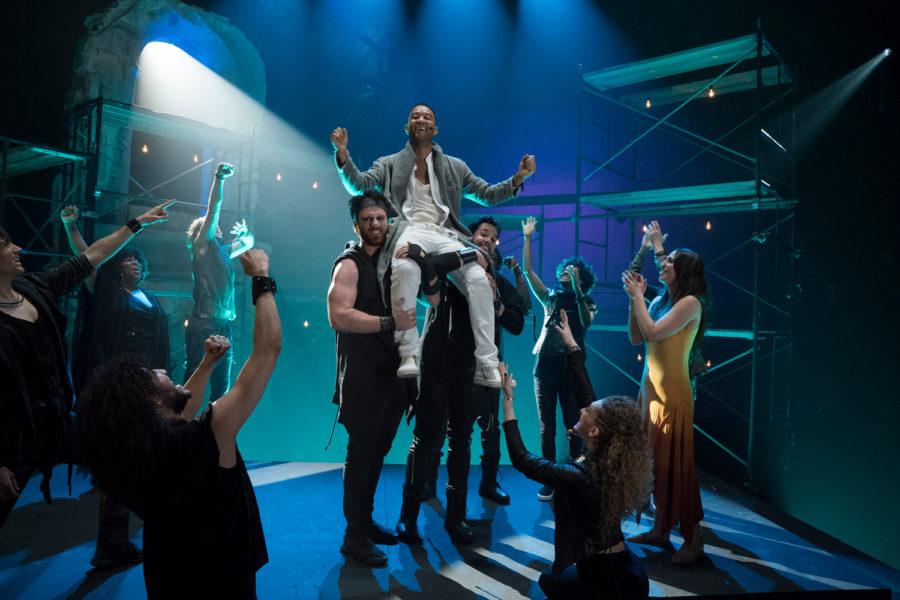Imagine you’re watching an image of the crucifixion of Jesus Christ — one of the most dramatic moments in the Christian faith — on your TV screen. Now add in a crowd of screaming, cheering fans. How do you feel?
If you were a Christian watching NBC’s broadcast of “Jesus Christ Superstar Live in Concert” last Sunday night, you would have found yourself in this very predicament. As far as major Christian holidays go, Easter has never been as commercialized as others, like Christmas. But when NBC presented “Jesus Christ Superstar” on Easter Sunday, the banality of commercialization came to Easter in a big way, ruining the reception of a great musical and aggravating many in the process.
Of course, we’ve had mall Easter bunnies, endless colorful candy displays in grocery stores and egg hunts across America for decades. But these sold goods are more representative of the secular aspects of Easter rather than the Christian beliefs — until NBC decided this Easter Sunday to air “Jesus Christ Superstar,” that is.
As the story of Jesus’ crucifixion, “Jesus Christ Superstar” might have seemed like an easy way to cash in on Christian audiences at the time of year when his death is celebrated. But NBC should have taken better care to ensure their showing was less controversial and preserve the quality of the original show.
The premise was simple and respectful enough — to broadcast a live version of Andrew Lloyd Webber and Tim Rice’s Tony-nominated musical on network television. The concept was commendable. Free musical theater viewings are invaluable when the average price of just one Broadway ticket can often come in at more than $100.
And “Jesus Christ Superstar” was unquestionably a spectacular portrayal of the Broadway musical. With a superstar cast including John Legend as Jesus, Sara Bareilles as Mary Magdalene, Alice Cooper as King Herod and “Hamilton” veteran Brandon Victor Dixon as Judas, the show was an inspiring showcase of talented musicians and actors. The production itself was phenomenal.
Many Christian groups have opposed “Jesus Christ Superstar” for a long time. Mary Magdalene’s important role in the show, as well as the notion that she and Jesus had a physical relationship, offended some. And many Christians don’t appreciate that “Jesus Christ Superstar” is told from the perspective of Judas, who betrayed Jesus and led him to his death. In contrast, other groups have supported the musical for its portrayal of Jesus. The Vatican endorsed “Jesus Christ Superstar” in 1999 — clearly, NBC is out of its element stepping into such a debate.
In the past, NBC has shown live musicals in December, such as “Peter Pan Live” and “The Sound of Music Live.” For “Jesus Christ Superstar,” the premiere of the show was moved to Easter Sunday, emphasizing the fact NBC was marketing the show toward Christians. NBC was oblivious to the kind of reception “Jesus Christ Superstar” was liable to receive, and they shouldn’t have put the musical in such a contentious context. Either way, it was a grave mistake to blindly present the show on Easter Sunday expecting a religious audience to tune in.
Last Sunday’s performance had 9.4 million viewers overall. Out of all the live musicals produced by major networks in recent years, “Jesus Christ Superstar” was a marked drop-off in viewings. “The Sound of Music Live,” also by NBC, had 18.6 million viewers, and Fox’s “Grease: Live” had 12.2 million.
In comparison, when Fox created its own Easter special, “The Passion,” they decided to air it on Palm Sunday, one week before Easter Sunday. “The Passion” had a similar format to “Jesus Christ Superstar.” Both were live, in-concert depictions of Jesus’ final days on Earth. Yet despite lacking the following and acclaim of “Jesus Christ Superstar,” “The Passion” still managed to amass 6.6 million viewers.
This is partially due to NBC’s choice to air “Jesus Christ Superstar” on Easter Sunday. Many people celebrating Easter are likely to be spending time with their families or in religious worship. Thus, not only would it have been more respectful for NBC to air “Jesus Christ Superstar” on a different date, they would have likely had more viewers as well.
But what truly pushed this production over the edge was NBC’s decision to air the product in a concert setting. To make things worse, executive producer Marc Platt encouraged the massive audience watching the production in person to react as though they were at any other concert, screaming and clapping during emotional parts of the production. As a result, the audience ended up enthusiastically cheering through Legend’s crucifixion as Jesus.
Legend is a talented performer and surely deserved the standing ovation he received during curtain call, but it was highly disturbing that NBC’s live audience seemed ecstatic to view the death of Jesus. This could have easily been stopped simply by eliminating the live audience or even by Platt refraining from his pre-show speech encouraging the applause.
The NBC showing had many moving moments. Its stars provided fantastic performances, and it could have been the best live musical we have seen in recent years. However, by using poor judgment when planning the show, NBC refused to honor the tradition and sanctity of Christianity, while marketing the show as an event for Christians.
In the future, networks should remember the devil’s in the details — and pay closer attention to when and how they choose to approach traditions.
Alexis primarily writes about local issues and student life for The Pitt News. Write to Alexis at alb413@pitt.edu.


